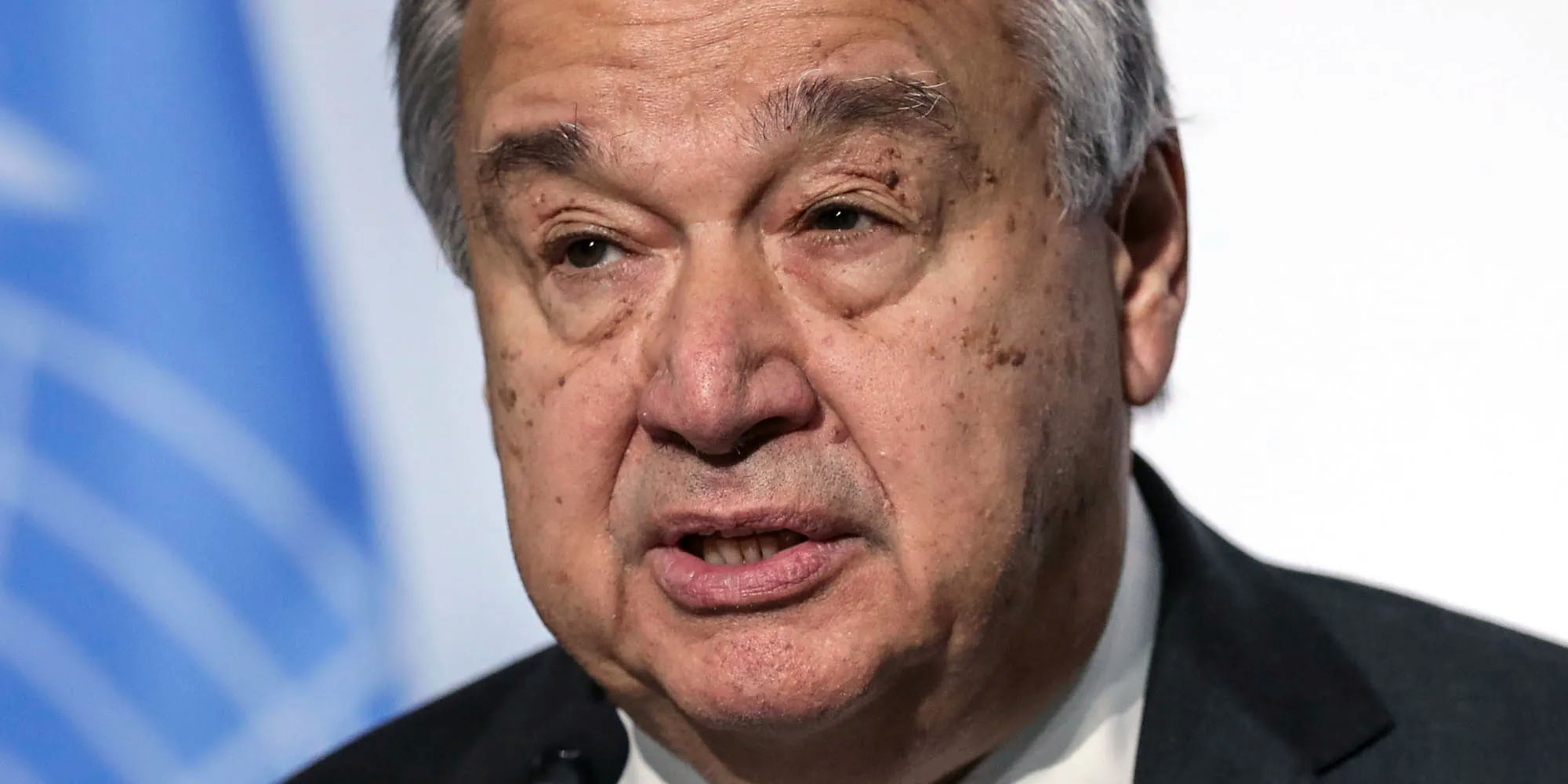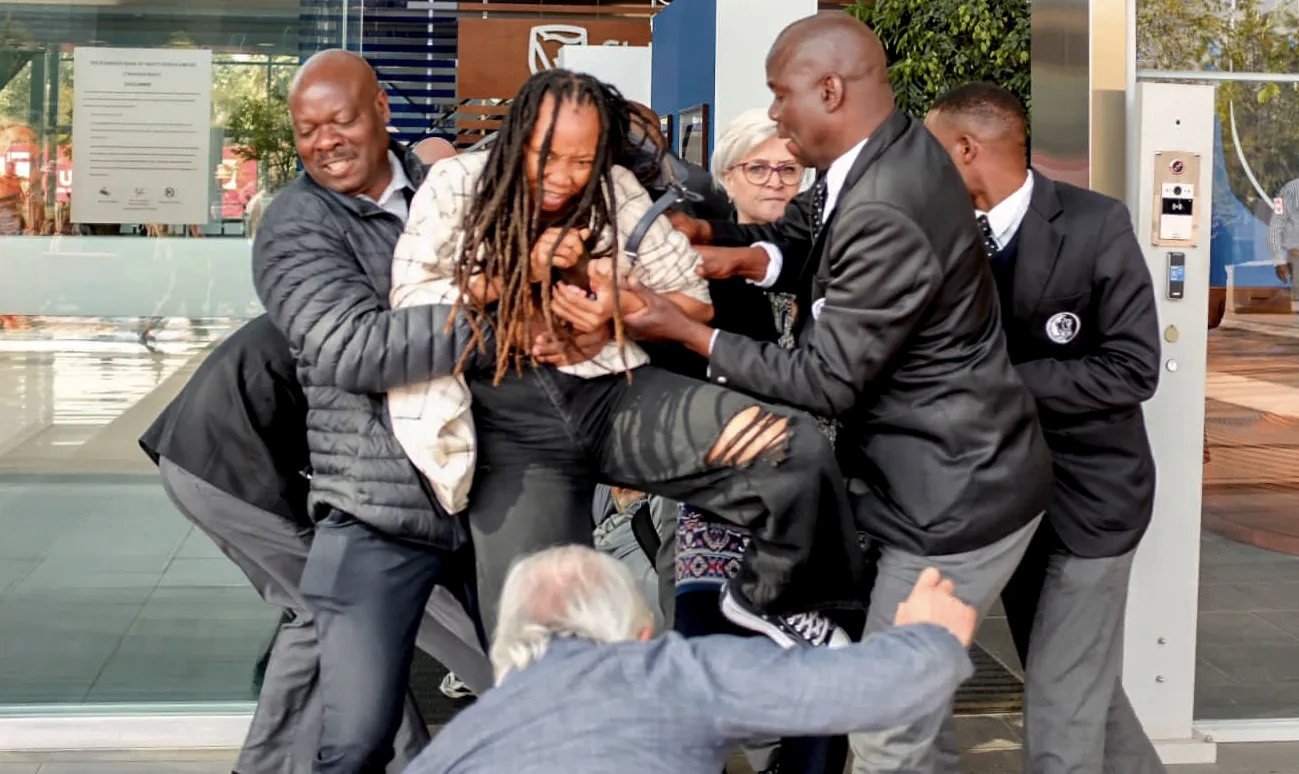Two weeks ago, Extinction Rebellion (XR) activists held a three-day occupation outside the head office of Standard Bank in Rosebank, Johannesburg. It was an act of civil disobedience, a deliberate and peaceful provocation to Standard Bank which, the organisers say, aimed to highlight its continued financing of fossil fuels, and in particular the East African Crude Oil Pipeline project. It followed a demonstration earlier in the year and the bank’s refusal to talk to the protesters and respond to their issues.
The action took place in the same week that UN secretary-general António Guterres told world leaders at the UN Climate Ambition Summit that “humanity has opened the gates of hell” and called out the “naked greed and entrenched interests raking in billions from fossil fuels”.
Guterres’s strident language is itself a form of civil disobedience. He no longer couches his words in diplomatic euphemism. He might as well have been speaking of Standard Bank and other big banks.
 UN secretary-general António Guterres at the UN Ocean Conference in Lisbon, Portugal, on 27 June 2022, where he blasted global energy companies for 'immoral' oil and gas profits. (Photo: EPA-EFE / Miguel A Lopes)
UN secretary-general António Guterres at the UN Ocean Conference in Lisbon, Portugal, on 27 June 2022, where he blasted global energy companies for 'immoral' oil and gas profits. (Photo: EPA-EFE / Miguel A Lopes)
One of the XR’s demands was for a televised debate with Standard Bank CEO Sim Tshabalala. The other was that Standard Bank end its financing of new coal projects by 2024 and instead invest in renewable energy access for poor communities.
In response Standard Bank’s private security henchmen from TSU Protection Services, supported by the SAPS, acted as if it was they who faced an existential threat. Among other violations, they violently prevented a Maverick Citizen journalist from doing her job and deleted photos from her phone. Then, two days later, without warning and while negotiations to end the protest were going on, they dismantled the occupation and arrested one of the protesters, Angelo Doyle, who was violently manhandled for shouting a slogan, not because he acted threateningly.
Doyle was initially held for several hours inside the bank and then transferred to police cells in Hillbrow where he spent the night among people accused of criminal offences in one of the most violent police precincts in the country.
His phone was illegally confiscated and is still being retained “for investigation”.
 Police and an unidentified private security officer confiscate items from the bag and pockets of protester Angelo Doyle at Standard Bank in Rosebank, Johannesburg, on 21 September 2023. (Photo: Mark Heywood)
Police and an unidentified private security officer confiscate items from the bag and pockets of protester Angelo Doyle at Standard Bank in Rosebank, Johannesburg, on 21 September 2023. (Photo: Mark Heywood)
It’s worth reminding readers that the right to protest is part of our Constitution, which says: “Everyone has the right, peacefully and unarmed, to assemble, to demonstrate, to picket and present petitions.”
To exercise that right does not need permission. It was built into our Constitution for good reason. It stems from the trauma we still carry as a society over peaceful protests like Sharpeville, Soweto and Marikana. It is essential to the practice of democracy.
The job of the police is to protect protesters, especially if they are not endangering other people or property. By most accounts this was a fairly benign protest.
Once upon a time, TAC too engaged in nonviolent civil disobedience, breaking unjust laws. Today it is celebrated.
Amid an outcry about press freedom and its role in the violence, Standard Bank was quick to patch up its relations with Daily Maverick and the South African National Editors’ Forum, with CEO Tshabalala intervening directly and the bank issuing an apology. It promised to “implement further training to upskill and sensitise those who are tasked with handling matters of this nature”.
How and whether it will do that is another question.
But Standard Bank has not acted to apologise to the protesters, or taken the moral high road to reach out to speak to them.
Read in the Daily Maverick: Climate activists: How far is too far in raising the climate alarm?
XR is not the enemy. On the other hand, despite their protestations of good corporate citizenship, Standard Bank’s actions and omissions align them with a growing intolerance and violence towards activists and the use of private armies against nonviolent people who are trying to protect our planet.
Read our editorial of May 2022 on this: Human rights defenders killed: Will Nokuthula Mabaso’s death be in vain?
Over recent months I have observed the burgeoning activism of Extinction Rebellion in South Africa. It’s a young movement, cutting across class, race, gender and age. It feels to me a bit like the Treatment Action Campaign (TAC) did in its early days. The TAC’s outrage over pharmaceutical company greed, and the protests it held against big pharma companies like GSK and Pfizer, now finds parallel in today’s mounting outrage against those who prop up fossil fuels, at enormous cost to life, livelihood and the future of the young.
Once upon a time, TAC too engaged in nonviolent civil disobedience, breaking unjust laws. Today it is celebrated.
 Daily Maverick journalist Lerato Mutsila is thrown out of the Standard Bank headquarters in Rosebank, Johannesburg, on 19 September 2023. (Photo: Kiara Affat)
Daily Maverick journalist Lerato Mutsila is thrown out of the Standard Bank headquarters in Rosebank, Johannesburg, on 19 September 2023. (Photo: Kiara Affat)
The XR protest reflects a frustration among activists with the business-as-usual approach of the government and civil society, and this too presents parallels with the TAC. When the TAC started its campaign in the late 1990s, it started by calling out other members of civil society, stuck in a holding pattern of conferences, self-congratulation and co-option.
Something similar is needed again.
Their calls for a boycott of Standard Bank… have the same potential for traction as the boycott of Barclays Bank over its support to apartheid
Truth be told, the climate justice movement in South Africa is not yet catalysing awareness, action and ideas on the scale that is needed: instead it exists in little corners, occupied by things like the Presidential Climate Commission, which while they do important work, are not resonating with or educating the mass of people about the dangers that lie ahead. As often happens with NGOs they’ve developed their own exclusive language, networks, circuits.
Which is why it is disappointing that instead of solidarity the XR occupation was met by apathy. It was business as usual in Braamfontein and other NGO hubs.
Nevertheless, Sim Tshabalala’s advisers should inform him that the climate activists present more than just a nuisance factor. They are calling on NGOs to close their accounts with the bank. They are meeting with creatives, churches and trade unions. International organisations like Bank Track are planning a solidarity picket in London next week. They are planning to keep the bank in the spotlight.
As the climate breakdown death toll mounts, their calls for a boycott of Standard Bank, and other shows of rejection and denunciation of its business model, have the same potential for traction as the boycott of Barclays Bank over its support to apartheid, eventually forcing its disinvestment from South Africa.
Read in the Daily maverick: Thanks, but no thanks: Standard Bank can have its journalism award back
As the saying goes: “Never doubt that a small group of thoughtful, committed individuals can change the world. In fact, it’s the only thing that ever has.”
Yet, the climate crisis and global heating is everyone’s business. There is no social justice or human rights issue that will not be adversely affected by it. It’s a threat to our constitutional vision of equality as much as State Capture was. It’s time we all understood this.
Now that the gates of hell are open (even if not yet in your neighbourhood), it’s time everyone acted to mitigate the sixth mass extinction. DM




 Daily Maverick journalist Lerato Mutsila is thrown out of the Standard Bank headquarters in Rosebank, Johannesburg, on 19 September 2023. (Photo: Kiara Affat)
Daily Maverick journalist Lerato Mutsila is thrown out of the Standard Bank headquarters in Rosebank, Johannesburg, on 19 September 2023. (Photo: Kiara Affat) 